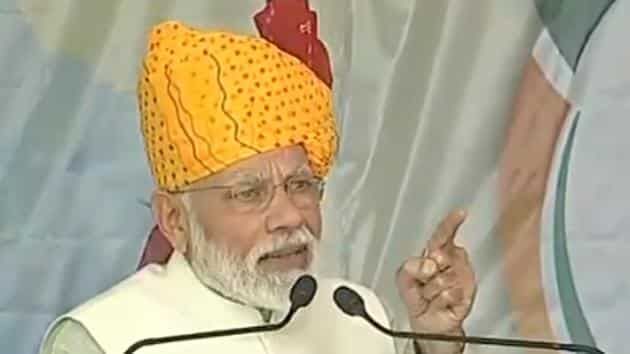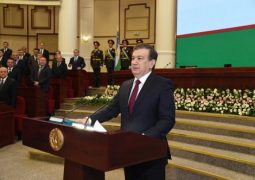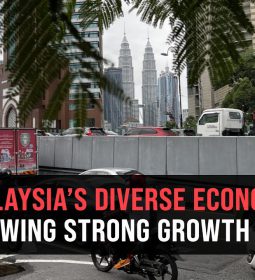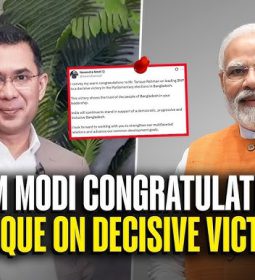For India’s BJP, national security is the main poll agenda

The ruling party has projected PM Modi as defender of national security as India gears up for first phase of elections.

Ghaziabad, Uttar Pradesh – A small cavalcade of cars, mini trucks and autorickshaws weaves its way through the cramped and dusty lanes of Ghaziabad, a suburb of India’s capital, New Delhi.
One of the mini trucks has large, black speakers tied at the back, which blare out patriotic songs from Bollywood films. Supporters of the ruling Bharatiya Janata Party (BJP), wearing saffron scarves and caps, line both sides of the roads as they raise slogans for their high-profile candidate, General Vijay Kumar Singh.
Singh, a former chief of the Indian army and minister of state for foreign affairs in the Narendra Modi government, is seeking re-election in the constituency he won with a record margin in 2014. Standing with local BJP leaders in a red Toyota convertible, he waves at his supporters holding marigold garlands to present to their leader.
The windshield on Singh’s vehicle has a large sticker that says “chowkidar” (watchman).
In the 2014 elections, “Vikas” (development) was the war cry that helped the Hindu nationalist BJP post a thumping victory against the Congress-led alliance.
But in 2019, “national security” has become the party’s call to arms as it prepares to defend the political turf it captured in the last election.
“National security is always an issue. At times it goes up and at times it comes down,” Singh told Al Jazeera at the end of his road show in Ghaziabad on Sunday.
The recent military standoff with Pakistan in the wake of a deadly suicide attack on security forces in India-administered Kashmir and the resultant surge in nationalist sentiment across the country appear to have handed the BJP the perfect ruse.
Hindu nationalist base
Until then, the ruling party was seen struggling to counter opposition attacks over rising unemployment, the highest in 40 years, and the deepening farm crisis.
The security-themed campaign received a boost last month when Prime Minister Modi added “chowkidar” as a prefix to his Twitter handle. In less than a day, dozens of top BJP leaders and hundreds of thousands of Modi’s online fans added “chowkidar” to their twitter handles.
The prime minister even held a video conference with nearly two million security guards from across the country, where he said the word “chowkidar” has become synonymous with patriotism and honesty.
“I want to ask first-time voters: Can you dedicate your first vote to the courageous pilots who struck Balakot [in Pakistan-administered Kashmir]? Can your first vote be in the name of the courageous martyrs who lost their lives in Pulwama (India-administered Kashmir)?” said Modi, addressing an election rally in Ausa in Maharashtra.
Speaking with Al Jazeera, BJP spokesperson Vijay Chauthaiwale said that his party expects the security issue to “definitely resonate” with the people, “especially due to the attack in Kashmir”.
He accused the opposition of weakness on security and terrorism, saying: “That is why they don’t want to debate it.”
Using platforms of national security and patriotism, issues which hang heavily in these elections, has also allowed the BJP to revive some of the traditional Hindu nationalist demands.
In its election manifesto released on Monday, the party said it would scrap article 370 of the Indian constitution that grants special status and political safeguards to the disputed territory of Kashmir under Indian control.
The manifesto also underlined the party’s commitment to constructing a temple for the Hindu god Ram at Ayodhya in Uttar Pradesh in place of a medieval-era mosque destroyed by Hindu mobs in 1992.
Pressing issues
Critics have accused the BJP of trying to divert voters’ attention from far more pressing issues such as unemployment or farmers’ distress.
“We are not shy of our performance on economy, job creation or building infrastructure. But at the same time, we are also drawing people’s attention towards security, while the Congress [party] is shying away from it,” BJP’s Chauthaiwale said.
Security analyst Ajai Shukla said he is not surprised that the discourse in the general elections has moved to security and not issues of economy or rural distress.
“This is convenient for the BJP because they can make a better case on security given the tone of jingoism that suffuses the political dialogue and the political narrative in India today,” he told Al Jazeera.
Shukla believes the BJP’s campaign strategy is going to pay it dividends.
“Other issues may be on the voters’ minds, but the BJP is hoping it would be compensated by those who would be won over to its cause on the strong leadership issue and on taking strong steps against Pakistan and in Kashmir.”
Shukla believes the opposition Congress is no match for BJP’s high-pitched election campaigning.
“You have got two arguments: the national security argument made by the BJP and the job creation and farmer distress argument made by the Congress. The arguments may be juxtaposed against one another, but the skill and vigour with which the parties make the case before the voters are what will govern which one of them carries the day. And in that the BJP is doing better than the Congress,” he said.
Social justice?
If “chowkidar” is the name of the mood in the BJP camp, the Congress campaign is trying to hammer home the word ‘nyay’ (justice) which is also an acronym for the flagship income guarantee programme proposed in its manifesto: Nyoontam Aay Yojana (NYAY).
The Congress leadership rejects the assessment that it has failed to match the BJP on security and says it is only a distraction from the real issues.
“The BJP knew it had not delivered in the last few years. They knew that their promises to the people of the country had turned into jokes. It was expected that they would resort to some emotive issue,” Syed Naseer Hussain, a Congress party Member of Parliament, told Al Jazeera.
- Previous Hope blossoms in spring as Afghans keep close eye on peace talks
- Next Trump discussed Iran, human rights with Saudi crown prince: White House
















